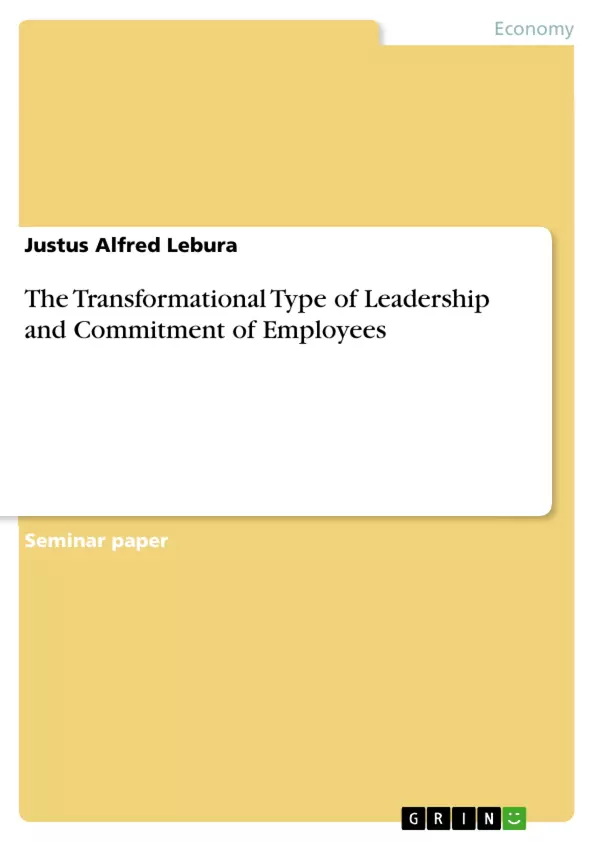This paper addresses the relationship between transformational leadership and commitment of employees. The paper focuses on ascertaining the extent to which dimensions such as individualized consideration, intellectual stimulation, inspirational motivation and idealized influence impact on employee outcomes such as affective, normative and continuance commitment.
The paper reveled that the dimensions of transformational leadership - individualized consideration, intellectual stimulation, inspirational motivation and idealized have significantly contributed toward outcomes of commitment of employees such as affective, normative and continuance commitment. Following the outcome of the discussion of the paper, it was concluded that transformational leadership enables work features that effectively motivate and drive the commitment levels of workers. It is recommended that related actions and efforts of the management are channelled toward building and reinforcing transformational leadership practices within the workplace, bridging and enriching the relationship between employers and their subordinates.
Inhaltsverzeichnis (Table of Contents)
- ABSTRACT
- INTRODUCTION
- LITERATURE REVIEW
- Transformational Leadership
- Conceptual Framework
- Commitment of Employees
- Conceptual Framework
- Relationship Between Transformational Leadership and Commitment of Employees
- METHODOLOGY
- Research Design
- Population and Sample
- Data Collection Instrument
- Data Analysis Techniques
- RESULTS
- Descriptive Analysis
- Inferential Analysis
- DISCUSSION
- Transformational Leadership and Commitment of Employees
- Implications for Practice
- CONCLUSION
- RECOMMENDATIONS
- REFERENCES
Zielsetzung und Themenschwerpunkte (Objectives and Key Themes)
This paper examines the relationship between transformational leadership and employee commitment in the Nigerian transportation sector. It investigates the extent to which various dimensions of transformational leadership, including individualized consideration, intellectual stimulation, inspirational motivation, and idealized influence, impact employee commitment, encompassing affective, normative, and continuance commitment. The paper aims to understand how transformational leadership can contribute to employee motivation and commitment, ultimately contributing to the success of organizations.
- Transformational Leadership and Its Dimensions
- Employee Commitment and Its Types
- The Relationship Between Transformational Leadership and Employee Commitment
- Impact of Transformational Leadership on Employee Motivation and Commitment
- The Role of Transformational Leadership in Organizational Success
Zusammenfassung der Kapitel (Chapter Summaries)
- ABSTRACT: This chapter provides a concise overview of the research paper, highlighting the key objectives, methods, findings, and conclusions. It addresses the relationship between transformational leadership and employee commitment and the impact of specific dimensions of leadership on different types of commitment.
- INTRODUCTION: This chapter introduces the concept of employee commitment, its importance for organizational success, and the role of leadership in fostering commitment. It emphasizes the significance of transformational leadership in driving employee motivation and commitment, particularly within the context of the Nigerian transportation sector. The chapter also outlines the research problem, stemming from the increasing employee discontent and turnover in the transportation industry.
- LITERATURE REVIEW: This chapter provides a comprehensive review of the relevant literature on transformational leadership and employee commitment. It explores the theoretical frameworks and empirical findings that underpin the relationship between these constructs. The chapter also examines the role of motivation and the implications of leadership styles in shaping employee perceptions and behavior.
- METHODOLOGY: This chapter details the research design, population and sample selection, data collection instruments, and data analysis techniques employed in the study. It outlines the specific methodologies used to investigate the relationship between transformational leadership and employee commitment.
- RESULTS: This chapter presents the findings of the research, including both descriptive and inferential analyses. It provides insights into the data collected and the statistical significance of the relationships observed between transformational leadership and employee commitment.
- DISCUSSION: This chapter interprets the research findings, discussing the implications of the results for the relationship between transformational leadership and employee commitment. It examines the practical implications of the study's conclusions, including the potential benefits of implementing transformational leadership practices in the workplace.
Schlüsselwörter (Keywords)
The key concepts and terms central to this research include transformational leadership, employee commitment, affective commitment, normative commitment, continuance commitment, organizational success, motivation, leadership styles, and the Nigerian transportation sector. These concepts are interconnected and explored in-depth throughout the paper, providing insights into the dynamics of leadership and its influence on employee behavior and organizational outcomes.
- Arbeit zitieren
- Justus Alfred Lebura (Autor:in), 2024, The Transformational Type of Leadership and Commitment of Employees, München, GRIN Verlag, https://www.hausarbeiten.de/document/1467186


